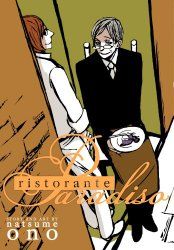This new one shot from Natsume Ono is a perfect little palette cleanser. Unlike her previous work, not simple (which I reviewed here), life in this work isn't one soul-crushing defeat after another as Ono takes a much more gentle and palatable approach to loss and love.
Ristorante Paradiso opens with 21 year old Nicoletta arriving unannounced at the restaurant owned by her mother's second husband. Forwarding a particularly odd emotional twist, Ono asks us to suspend common sense when we learn that Olga, Nicoletta's mother, abandoned her daughter because of a comment her lover once made about not accepting a wife who already had children. The Nicoletta of the first pages of the book is young, lost and lonely and while she is rightfully resentful that her mother chose love of a man over her, she tells herself she wants revenge -- to expose Olga to her husband -- but in reality she just wants to know her better. I had to set aside my anger at Olga's selfishness, primarily because if I didn't I could not really accept Nicoletta's quiet, but very transformative, journey in the story.
The restaurant is quaintly "quirky," similar to Fumi Yoshinaga's Antique Bakery, with its competent staff of mature, dignified (& glasses-wearing!) gentlemen who appear to be a bigger draw for female customers than the food. Nicoletta joins the staff, quite skeptical of other women's crushes and promptly ends up falling for the calm and kind headwaiter Claudio. As Nicoletta slowly becomes a fully-fledged member of the staff, she joins this charming "family" while also managing to reconstitute her broken one at the same time.
Although there is nothing particularly unique or wonderful about the character, Nicoletta becomes the "catalyst" that moves things along. She helps her mother recover her precious daughter, and she takes charge on Claudio's behalf when he seems unwilling or unable to move on from his broken marriage. In this work, characters find redemption not through drastic change but small moments of love and acceptance. There's a welcome emotional warmth here that was completely absent from her previous work, not simple.
Artistically, Ono's fond of flat shapes and simplistic, but elegant, character designs. I find her simple, yet somehow slightly "raw," style incredibly refreshing. Even though the tone of this work is quite different from her previous one, her generally minimalistic approach to storytelling seems to suit her art style quite well. As a whole, this work is an enjoyable visit to the world of the restaurant that we take with Nicoletta. I look forward to returning to this setting and these characters later this summer when the companion volume, Gente, will be published.
Review copy provided by Viz Media.


